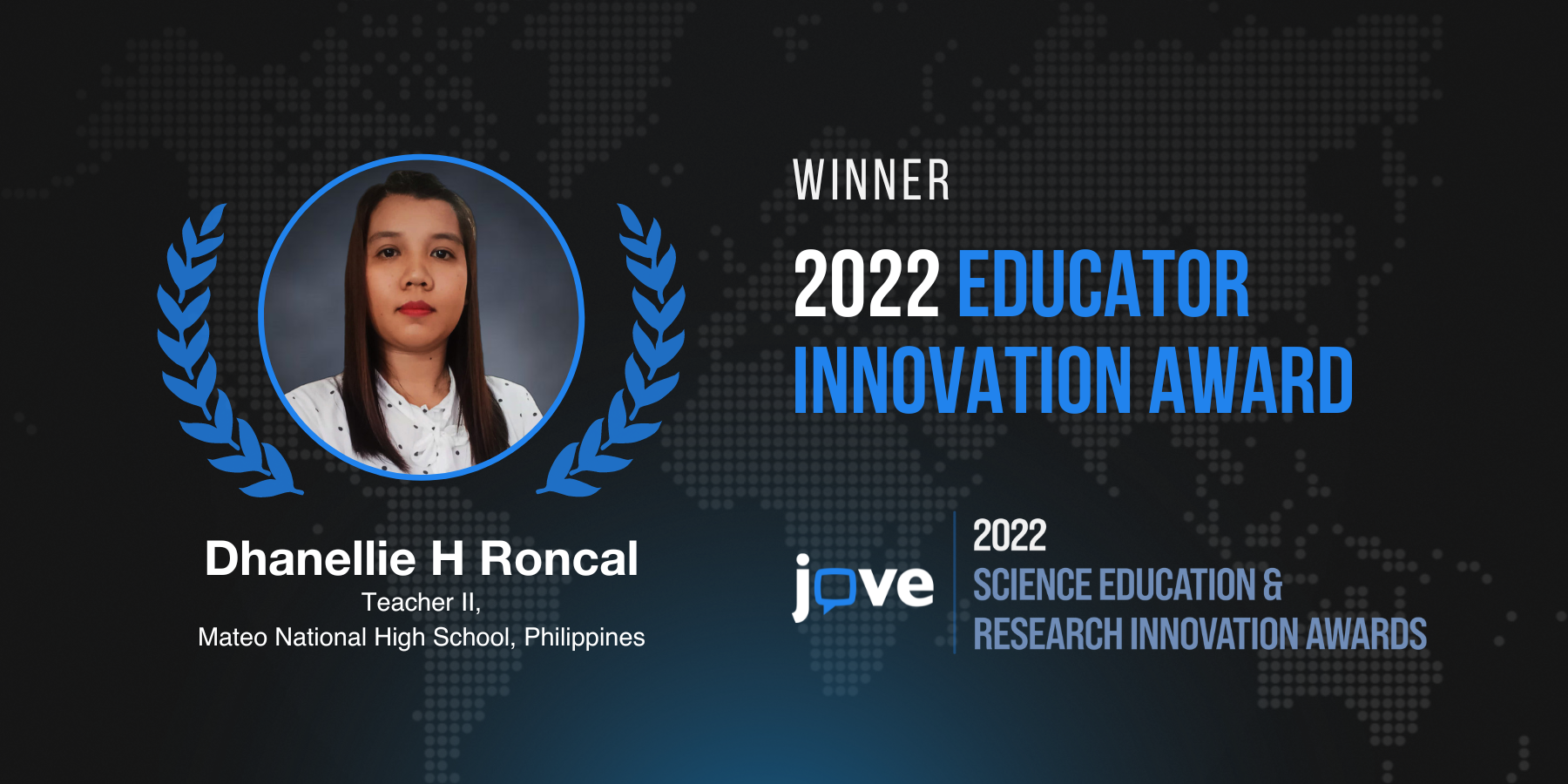The 2022 JoVE Educator Innovation Awards have paved the way to highlight the use of video resources to support learning outcomes and increase student engagement in STEM education.
Below you can read the winning entry by the 2022 JoVE Educator Innovation Award winner, Dhanellie Roncal, Teacher II, at Mateo National High School in the Philippines. Dhanellie shares how the teachers' love of cycling bridged the gap in delivering quality education during the COVID-19 pandemic.
Mateo National High School is a small junior and senior high school situated on the city's outskirts. Given our geographic location, the internet connection is not entirely stable, and not all of our students have access to online data. Furthermore, only 3 out of 10 learners have smartphones.
Plagued by the COVID-19 pandemic, schools nationwide in the Philippines were forced to pause face-to-face learning. Mateo National High School, along with our 380 learners, is not exempted from the mandate—teachers and students embraced modular distance learning. It has been an uphill feat because teachers had to print self-learning modules to be distributed to learners. On the same page, learners were obliged to stay and learn at home with their parents, guardians, siblings, or relatives as their learning facilitators. Given the situation, we've seen a drastic decrease in our learners' performance in terms of learning and their responsiveness in answering their printed self-learning modules.
Desperate times need a desperate solution—thus the birth of our educational innovation—Mateo SIklistas: Visit to Remediate, love for cycling helped bridge the gap in delivering quality education during the COVID-19 pandemic. 13 out of 18 teachers at Mateo National High School are cyclists.
Why not use our bikes to help our learners? I drafted a proposal to allow teachers to help our learners through biking, laying on the terms, conditions, methodologies, process, financial subsidiaries, COVID precautions, and everything in between. We secured a permit to visit our local health authorities and ensure that COVID-19 protocols are observed before implementing our innovation. We received a positive response and support from the local government, considering that our locality was declared a "Low-risk COVID-19 area." From there, we identified challenged learners from Grade 7 to Grade 12 who lag in answering their self-learning modules and submitting tasks. We devised a schedule, and every day, from Monday to Friday, we ride our bikes and visit our learners' homes to deliver and retrieve their self-learning modules. More importantly, we help them answer each module task and do remediation like reading, numeracy, and science experiments.
In Science and Technology, many activities and tasks in the learners' Science Modules require watching videos and performing experiments. I downloaded the videos and online resources beforehand, so whenever we visited, I would let the learner watch the video or view the online resource on my laptop. As for the experiments, I bring the needed materials during our visits and help the learner set up the experiment at home. That way, I can also answer questions they may have when doing the experiments.
We are still adopting this innovation, even when face-to-face classes have resumed, and we never feel exhausted or discouraged. Maybe because we enjoyed what we did and felt a sense of satisfaction while helping our learners, imagine the fun of riding our bikes—rain or shine—to visit and teach our learners at home.
Our efforts were not in vain, for we've seen massive improvements among our learners in every grading quarter. At the end of the school year, we've achieved the following outcomes;
0 DROP-OUT RATE
No learner dropped out of school despite the challenges of the pandemic.
0 RETENTION RATE
No learner was retained on the same year level.
0 SARDO REPORTED
No learners are classified as 'Students At Risk of Dropping Out.'
0 FAILURE RATE
No learner failed to move up to the following year's class.
0 FAILING GRADE
No learner received a grade lower than 80%
0 Learners With Failing Grades in Science from Grade 7 to Grade 12.
With these results, we've lived up to the expectation of the Philippines Department of Education that "Every Child Is A Champion—NO ONE SHOULD BE LEFT BEHIND."
Surprisingly, the one goal we have as teacher-cyclists—to help our learners thrive in their education through the pandemic —fruition into several noteworthy outcomes. Such as, commuting to schools on bikes has helped teachers become physically fit, cope with mental health issues and cut costs. There's also a positive response from parents who couldn't pick up and submit their children's modules consistently. At the same time, stakeholders were more motivated to support improvements in the school.
Ultimately, our efforts have been recognized by the Schools Division of Iloilo, particularly by the Superintendent, Dr. Roel F. Bermejo, as one of the Division of Iloilo's Effective Practices in Delivering Quality Education.
Currently, the scope and influence of the Visit To Remediate (VTR) Through Mateo Siklistas as an educational innovation is limited to Mateo National High School's catchment localities. In continuing the implementation of the VTR through Mateo Siklistas as an educational innovation, we look forward to other schools within the municipality —or the Division of Iloilo—adopting the same practice. Mateo National High School reaped positive outcomes and benefitted from the innovation, and it's our goal and moon-struck dream that other schools will experience the same.
Want to hear more from Dhanellie. H. Roncal? Register for our upcoming webinar featuring 2022 Educator Innovation Award Winners' stories to learn why videos are an indispensable tool in STEM teaching & learning.



